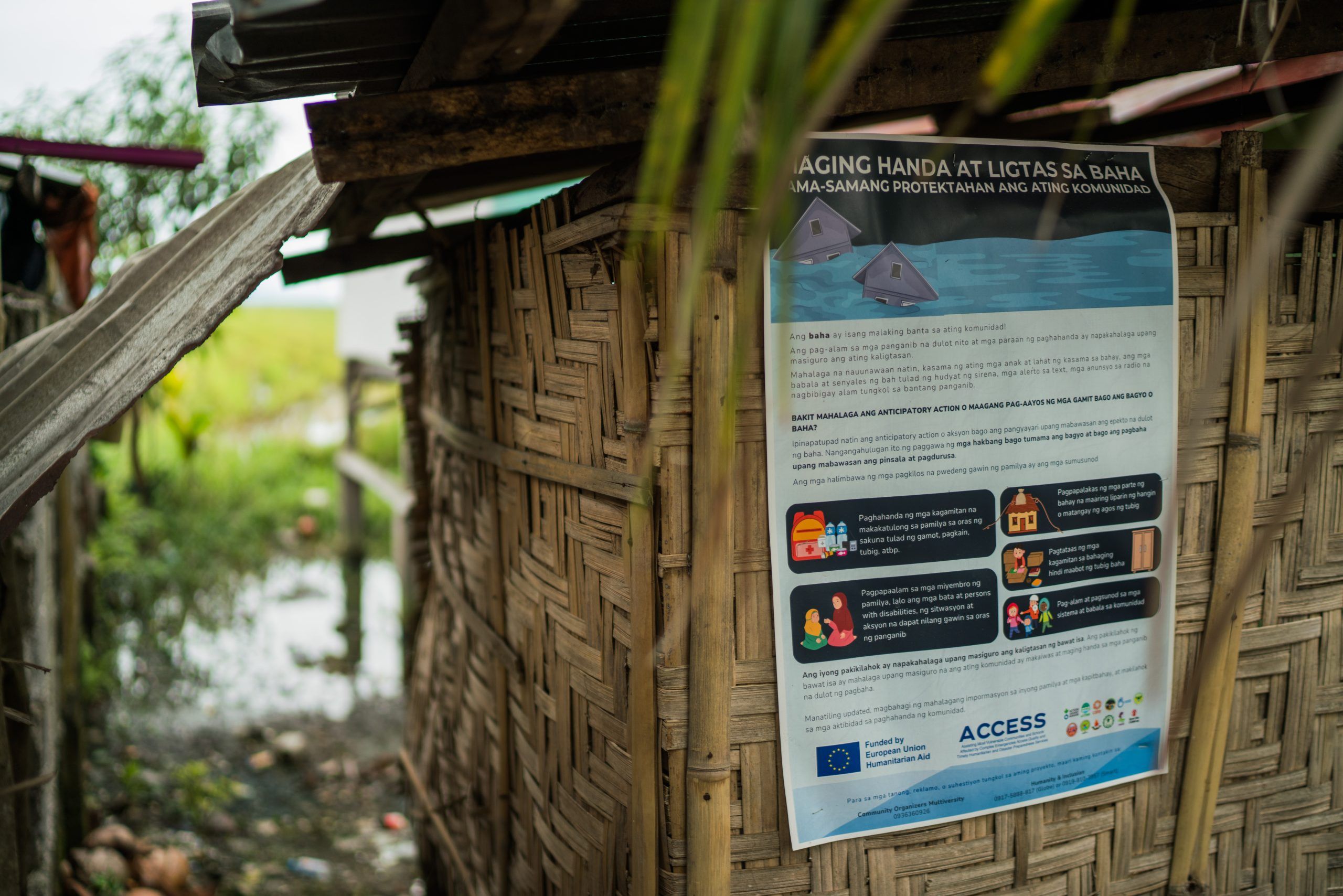Humanitarian NGOs Welcome New Philippine Imminent Disaster Law
The landmark legislation, Republic Act No. 12287, paves the way for proactive government response, protecting people before floods, typhoons, or other hazards hit
In a historic move to save lives and protect at-risk communities, the Philippine government has passed the Imminent Disaster Bill into law, establishing a national framework for anticipatory action – measures taken before a hazard hits or before its worst impacts are felt. The law mandates that government agencies act before impacts peak: to pre-position supplies, organize preemptive evacuation, or release early cash or in-kind support.
“This is a turning point for the Philippines: from reacting after a disaster to protecting people before it strikes. The real test is in implementation, and we stand ready to work with government and communities to make anticipatory action a reality nationwide,” says Reiza Dejito, Country Director of CARE Philippines, the organization leading the European Union Humanitarian Aid-funded ACCESS Project, which implements anticipatory action initiatives.
“With this new law, the government can now officially lead anticipatory actions and utilize state resources to save lives and protect livelihoods. The era of waiting for the most vulnerable to experience the full brunt of a disaster before help arrives is, we hope, coming to an end,” says Lot Felizco, Executive Director of Oxfam Pilipinas, an ACCESS consortium member.
Centering Community Voices
People most affected by typhoons, floods, and other hazards are now covered by a clear legal mandate for early action. Civil society organizations, including ACCESS members, helped ensure the law is grounded in the realities of communities frequently affected by disasters, amplifying local voices to inform policy and keeping the law steadfast to its core purpose: to save lives, protect livelihoods, uphold dignity, and adhere to the ‘do no harm’ principle.
“For the longest time, our communities have been on the frontlines of climate change, waiting for the next storm to take everything from them. This law gives us hope and a fighting chance. It is a testament to what is possible when we work together towards a common goal of resilience,” says Esteban Masagca, Executive Director of People’s Disaster Risk Reduction Network (PDRRN).
Adds Sindhy Obias, Executive Director of Assistance and Cooperation for Community Resilience and Development (ACCORD), “More than anticipating disasters, the law recognizes the strength and wisdom of Filipino communities who have long been the first responders. This legal foundation strengthens our collaboration with government, partners, and communities so that preparedness is a guaranteed right for every family at risk.”
‘No One Left Behind’
The law helps broaden support for women, girls, older adults, people with disabilities, and others who often face barriers to aid.
“Disasters affect girls differently and disproportionately,” says Pebbles Sanchez-Ogang, Executive Director of Plan International Pilipinas. “The new law enables earlier action to protect girls and meet their specific needs before disasters strike, helping ensure that every child—especially every girl—is safe, empowered, and resilient in the face of typhoons and other emergencies,” she adds.
Says Melanie Ruiz, Country Manager of Humanity & Inclusion Philippines, “Through this new law, we continue to promote inclusive anticipatory action, enabling meaningful participation of people with disabilities, older adults, women, children, and other marginalized groups in disaster preparedness, to ensure no one is left behind.”
Enabling Proactive Measures
The new law provides a clear legal framework for government agencies at all levels to:
- Pre-position goods and supplies in areas forecasted to be hit by a hazard
- Implement pre-emptive evacuations to ensure citizen safety
- Distribute cash or aid assistance to families so they can meet basic needs without resorting to negative coping strategies
- Secure assets and livelihoods, such as boats, livestock, and equipment, minimizing economic loss
This proactive approach protects development gains and breaks the cycle of poverty exacerbated by repeated disasters. “This legislation is a milestone that reinforces ongoing efforts to integrate early action, preparedness, and disaster risk reduction into both humanitarian and development programs,” says Suresanathan Murugesu, Country Director of Action Against Hunger Philippines.
Proven Anticipatory Action Activations
Since 2023, ACCESS has been delivering anticipatory action support to the most at-risk, difficult-to-reach communities in Mindanao and across the country, covering hazards such as floods and typhoons, as well as conflict. This meant communities had access to essentials such as food and water, could safeguard personal belongings and livelihood tools, and move to safety before impact.
During the 2024 El Niño in the Bangsamoro Autonomous Region in Muslim Mindanao (BARMM), SUPREME BARMM, another EU Humanitarian Aid-supported initiative led by Oxfam Pilipinas, activated the country’s first anticipatory action for drought. Communities in the Special Geographic Areas (SGAs) received critical cash, in-kind, and information assistance before the drought peaked, helping to reduce its impact. The project also activated anticipatory action ahead of severe floods in Cotabato City between 2020 and 2023.
A Call for Collective Action
While the passage of the law is a win, its rollout will require close collaboration between government, civil society, and communities in hazard-prone areas. ACCESS consortium members are committed to ensuring that efforts remain grounded in the lived realities of those most affected.
About ACCESS
ACCESS is multi-year, multi-sectoral humanitarian and disaster preparedness initiative funded by European Union Humanitarian Aid. It serves the most affected, underserved, difficult-to-reach communities in the Philippines, where natural hazards, conflict, recurrent displacement, and intensifying climate-related risks continue to threaten lives and livelihoods. Since 2023, the project has helped more than 200,000 people.
ACCESS is implemented by a consortium of 14 local and international organizations: ACCORD, Action Against Hunger Philippines, CARE Philippines, Community Organizers Multiversity (COM), Humanity & Inclusion Philippines, Integrated Mindanaons Association for Natives (IMAN), Kadtabanga Foundation for Peace and Development Advocates, Mindanao Organization for Social and Economic Progress (MOSEP), Oxfam Pilipinas, People’s Disaster Risk Reduction Network (PDRRN), Plan International Pilipinas, Save the Children Philippines, United Youth for Peace and Development (UNYPAD), and United Youth of the Philippines – Women (UnYPhil-Women).

For media inquiries, please contact:
Tanya Mariano
Communications Specialist – Humanitarian, Disaster Resilience, and Peacebuilding Unit
CARE Philippines


